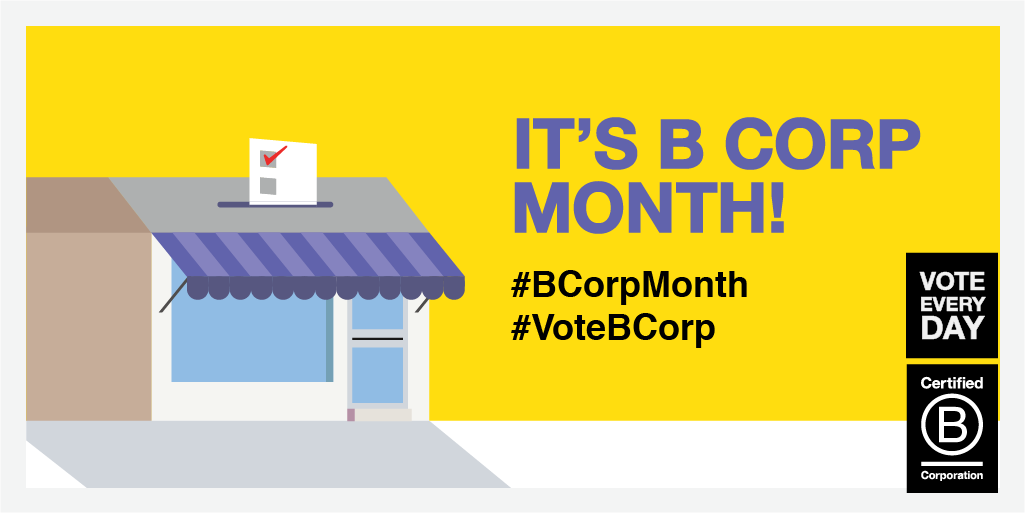All this month, we’ll be sharing stories related to B Corp’s “Vote Every Day” campaign. The first installment is from Client Service Associate, Jake Gandolfi.
When you vote for a candidate in an election, you are not just voting for the person, but for their values, ideologies, and stances on certain issues. This is important and happens every couple of years. When you spend your money, you are not just buying a product or service, you are also supporting that business’ values, ideologies, and stances on certain issues. This is also important and happens every single day.
 After realizing that each dollar you spend is actually a vote with deeper implications, you begin to think more critically about how you spend your money. Should I buy the fair-trade bananas or the normal ones? Should I shop online for everything or try to buy some things locally? Should I invest with a firm that owns oil, tobacco, and firearms stock, or with one that only invests in stock that is fossil-fuel-free and socially and environmentally responsible?
After realizing that each dollar you spend is actually a vote with deeper implications, you begin to think more critically about how you spend your money. Should I buy the fair-trade bananas or the normal ones? Should I shop online for everything or try to buy some things locally? Should I invest with a firm that owns oil, tobacco, and firearms stock, or with one that only invests in stock that is fossil-fuel-free and socially and environmentally responsible?
Shameless Earth Equity plug, sorry not sorry.
But it was this kind of thinking that led me to one of the biggest decisions of my life: the decision NOT to buy a car, and instead walk and bike for transportation. And this may be more of an extreme example than deciding which eggs to buy at the market, but it was one that I was finally able to see through last year when the circumstances allowed for it. More on that in a second.
We all know that cars are big, metal polluters on wheels. In recent years technology has improved to reduce their emissions, but not to the point of making significant differences. The EPA estimates that a typical passenger vehicle emits 4.6 metric tons of C02 annually. Multiply that with the number of vehicles on the road today and that number is huge. Combine that number with each country’s annual output of C02 from their vehicles and it becomes incomprehensible.
Amount of CO2 the typical car emits per year.
Unfortunately, it doesn’t stop there. When we choose to drive, we also choose to purchase more gasoline, fueling the oil industry (no pun intended) into more oil extraction, leading to more environmental costs. We choose to pack our already overcrowded streets, leading to strains in community resources, i.e. our tax dollars. And we choose to fill our community’s air with C02, eventually having effects on overall public health. There is much more, but you get the idea. These were the consequences that continuously racked my brain. I then wanted to challenge myself to be the change I wanted to see.
So, I finally made the decision to ditch the car.
I would be lying if I said the fundamental lifestyle changes I had to make were easy. For one, I no longer have the virtual unlimited mobility a car offers. My bicycle does not have a seat warmer, so winter has taken on a whole new meaning. In a supposedly “pedestrian friendly” city like Asheville, the amount of near accidents with motorists (and one instance of actually being hit by a car) I have had while walking and biking through these streets is shocking to say the least.
But it’s not all bad, I assure you.
One of the major benefits of my car-free lifestyle comes in the form of an exponential increase in exercise. There are also the smaller joys like never having to sit in traffic, yelling at everyone else for being morons (or other colorful words). Not having to find or pay for a place to park. And of course, who could forget the incredible financial savings realized by not having to pay for gas, insurance, maintenance, and the car itself, roughly $7,000 a year by my quick estimate?
Estimated savings per year going car-free!
What really excites me, though, is that my dollars no longer support the environmental and societal damages mentioned above. I have let my voice be heard and it says loud and clear “I understand the consequences that owning and driving a car bring, and I am willing to make a change.” Does this mean I have sworn off vehicles for good? Absolutely not. When the time comes, I will return to the modern world. I can only hope I will remember the lessons this experience has taught me.
To touch on the subject again, I realize not everybody can make a change as drastic as mine. Like I said, my circumstances only allowed for it over the past year. I was able to move to a walkable city, found a job two blocks from my house, and I have a very supportive partner, who herself has a embraced a car-free lifestyle (but who I’m also sure yearns for the day we can just drive to dinner or the market again). These were very fortunate for me, but also incredibly unique.
This begs the question, then. Armed with the knowledge that your dollars are votes, and given your specific circumstances, what changes are you willing to make to have a real difference in the world?



